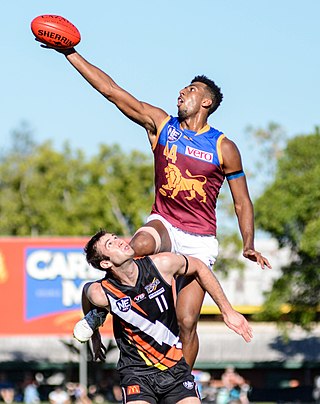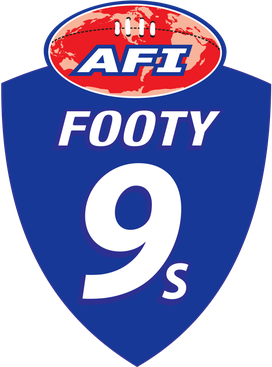Related Research Articles

Australian rules football, also called Australian football or Aussie rules, or more simply football or footy, is a contact sport played between two teams of 18 players on an oval field, often a modified cricket ground. Points are scored by kicking the oval ball between the central goal posts, or between a central and outer post.

The Western Bulldogs are a professional Australian rules football team that competes in the Australian Football League (AFL), the sport's premier competition.

Docklands Stadium, also currently known by naming rights sponsorship as Marvel Stadium, is a multi-purpose sports and entertainment stadium in the Docklands area of Melbourne, Victoria, Australia. Construction started in October 1997 and was completed in 2000 at a cost of A$460 million. The stadium features a retractable roof and the ground level seating can be converted from oval to rectangular configuration.

The Melbourne Sports and Entertainment Precinct is a series of sports stadiums and venues, located in Melbourne, Victoria, in Australia. The precinct is situated around 3 km east of the Melbourne central business district, located in suburbs of Melbourne and Jolimont, near East Melbourne and Richmond.

The E. J. Whitten Legends Game was an annual charity all-star Australian rules football match played in Australia. Retired star players were reunited, along with selected non-footballing celebrities, in a State of Origin interstate game between Victoria and a composite side known as the All-Stars. The game was contested annually from 1996 to 2019 and played under Superules.

Recreational Football was a non-contact version of the Australian rules football game first played in 2003 and later sanctioned by the Australian Football League's game development arm, it was inspired heavily by the growing popularity of tag rugby. It was a more accessible version of Australian rules football that people could pick up and play. It was a mixed competition, with eight players on each team, accessible to players of both sexes, all shapes and sizes and requires minimal equipment to play. Rec Footy was criticised mainly by Australian rules players for appearing similar to netball and being too restrictive, lacking of ability for skilled footballers to run kick and play naturally whilst also penalising newer unskilled players with frequent turnovers.
The Indigenous All-Stars is an Australian rules football team composed of players that identify as Indigenous Australian or with an indigenous culture.

Women's Australian rules football, is the female-only form of Australian rules football, generally with some modification to the laws of the game.
Nine-a-side football is a sport based on Australian rules football played informally by Aussie rules clubs but not yet an official sport in its own right.

Australian rules football in the Australian Capital Territory has been played continuously since 1911 and was the most popular football code in the nation's capital Canberra between 1978 and 1982. The current governing body is AFL Canberra founded 1922, while the development body is AFL NSW/ACT established in 1999.

Australian rules football in Victoria is the most watched and second most participated code of football. Australian rules football originated in Melbourne in the late 1850s and grew quickly to dominate the sport, which it continues to. Victoria has more than double the number of players of any other state in Australia accounting for approximately 42% of all Australian players in 2023 and continues to grow strongly. Only Soccer in Victoria has more football participants, though the code's growth in Victoria has made up much ground lost to that code over previous decades such that they have now a similar number of players. The sport is governed by AFL Victoria based in Melbourne. The national governing body, the AFL Commission is also based in Melbourne.

The Melbourne Rectangular Stadium, referred to as AAMI Park due to a sponsorship arrangement, is an outdoor sports stadium situated on the grounds of Edwin Flack Field within the Sports and Entertainment Precinct in the heart of the Melbourne central business district.
Variations of Australian rules football are games or activities based on or similar to the game of Australian rules football, in which the player uses common Australian rules football skills. They range in player numbers from 2 up to the minimum 38 required for a full Australian rules football.

Casey Fields is a $30 million, 70 hectare multi-sports complex in the City of Casey at Cranbourne East a southeastern suburb of Melbourne. The complex is home to Australian rules football, cricket, netball, soccer, tennis, cycling, golf, and rugby football.

Australian rules football culture is the cultural aspects surrounding the game of Australian rules football, particular to Australia and the areas where it is most popular. This article explores aspects and issues surrounding the game, as well as the players, and society. Australian Rules is a sport rich in tradition and Australian cultural references, especially surrounding the rituals of gameday for players, officials, and supporters.

Edward James Whitten Sr. OAM was an Australian rules footballer who played for the Footscray Football Club in the Victorian Football League (VFL).

Footy 9s is a version of Australian rules football created by Australian Football International.

Australian Football International (AFI), is a world development body for the sport of Australian rules football. The organisation has developed a version of the sport known as Footy 9s that it claims will support global expansion of Australian rules football, and lead to it becoming an Olympic sport.
The 2019 AFL X tournament was the second Australian Football League (AFL) pre-season series of matches, played under the laws of AFLX, a variation of Australian rules football. The tournament took place on 22 February 2019 at Shanghais's Marvel Stadium
References
- ↑ "AFLX: the business strategy behind the spectacle". Australian Financial Review . 11 February 2018.
- ↑ Radical new concept AFLX set to be launched on pre-finals bye weekend by Chris Cavanagh for the Herald Sun 22 June 2017
- 1 2 "X off the map: AFL to remove AFLX from pre-season fixture". afl.com.au. Retrieved 7 August 2019.
- ↑ "AFLX 2019 rules explained". YouTube, AFL official account. 4 February 2019.
- ↑ AFLX 2019 rules explained, Essedon FC official site
- ↑ "AFLX Explained". AFL.com.au. 13 February 2018.
- 1 2 2017 AFL Annual Report
- ↑ Implementation of AFLX idea could in the end do more harm than good by Craig Little for The Guardian 26 July 2017
- ↑ Lusted, Peter (6 February 2018). "AFL launches AFLX, using rectangular fields to attract new supporters overseas". ABC News . Retrieved 12 September 2018.
- ↑ "AFLX Opening Weekend Attracts Int'l Interest". Sports Business Daily . 19 February 2018. Retrieved 18 February 2019.
- ↑ AFLX game changer: Get ready for 20-point supergoals By Ben Guthrie for afl.com.au 4 February 2019
- ↑ "Get ready for 'EJX': Legends game gets new format and new home". Australian Football League. 25 July 2019. Retrieved 25 July 2019.
- ↑ New football formats set to change the game By Daniel Webb for Shepparton News 29 September 2022
- ↑ Jackson Ryan (16 December 2018). "The AFLX Is The Greatest Farce In Professional Sport". Ten Daily.
- ↑ Alana Schetzer (17 December 2018). "Not even superpowers can give soulless AFLX what it most needs". The Guardian.
- ↑ Richard Hinds (16 February 2018). "AFLX: If you wanted to kill AFL stone-dead, you'd turn it into this hollow yawn-fest". ABC News.
- ↑ "AFLX - a stroke of sport marketing genius?". ESPN . 14 February 2018. Retrieved 18 February 2019.